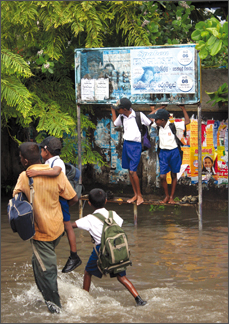Can we go on defying nature and her ways?
 This
week Iceland volcanic ash is again unleashed over air-space in
Europe. With it blowing off to the Sub- Saharan African continent
during the past few weeks; the global media’s attention on the issue
was lukewarm at best. Since the disruptions at UK’s airports this
weekend, nature’s release of its wrath is once again gaining the
world’s attention. This
week Iceland volcanic ash is again unleashed over air-space in
Europe. With it blowing off to the Sub- Saharan African continent
during the past few weeks; the global media’s attention on the issue
was lukewarm at best. Since the disruptions at UK’s airports this
weekend, nature’s release of its wrath is once again gaining the
world’s attention.
Immense threat
|

The inundated city, a testimony to man’s unwise acts. Picture by
Sulochana Gamage
|
Mother Earth seems to be punishing us from both ends. At the bottom
of the ocean in the Gulf of Mexico, now for several weeks oil is leaking
from a drill hole of an offshore oil rig. The threat to all forms of
life around is immense. Thousands of barrels of chemicals are poured on
to the ocean to disintegrate the thousands of barrels of oil (‘Black
Gold’) gushing out each day, in what may be seen as yet another valiant
demonstration of the human might in fighting our own follies and the
resultant nature’s wrath.
The very mainstream global media that runs weeks of focused
programing when Climate Change summits and Earth Days approaches seem to
treat these as ‘events’ and natural calamities like the many others we
have witnessed. Damage will be ‘estimated’, compensation to human
‘victims’ be paid, accountants and auditors will ‘balance’ the books and
once again, we the human race, will choose to forgive and forget.
Empty noises
The telethons for World Earth Day, Internet Bloggers’ competitions
leading to World Environment Day, the many conferences and other talk
shops, where lots of ‘noise’ is made and dollars spent, will continue to
be held. The same TV channels that hold the telethons calling for frugal
living are throwing at us advert after advert of luxury goods
encouraging wasteful lifestyles. The same magazines that feature cover
stories singing praises for Mother Nature feature adverts and articles
that present the merits of glitzy ways that are sure recipes for
unsustainable living.
The UN is re-examining the validity of the scientific evidence of the
Inter-governmental Panel on Climate Change (IPCC) allegedly for a few
errant scientists in the UK and the US, have opted to engage in an email
exchange where they claimed they doctored data, to overstate the
problem.
Some call it an attempt by a strong conventional energy lobby to
delay the implementation of measures to mitigate, taken both at Kyoto
and Copenhagen. These when taken-on by several key developed world
contributors to global warming, can indeed place heavy costs on these
companies. Others welcome it as an opportunity to clarify and further
validate the scientific evidence presented by thousands of scientists
from all over the world.
Wrath unleashed
The sad reality here though, is that Mother Nature seems to be sad,
discontent and angry. The melting of the glaciers has not stopped. The
harsh winters, temperature rises, torrent rains, droughts, tornados,
raging forest fires are all happening at more rapid frequencies than the
humans have witnessed ever before. Pandemics such as SARS, Chicken Gunya,
H1N1, Swine Flu occurred in closer frequency in recent times, suggesting
possible correlation of these to climate change issues. While the UN’s
IPCC probe may buy time for the world’s political and corporate
leadership; increase of sea levels will go on regardless.
Time for rethinking
Perhaps it is time for us humans to once again revisit the growth vs
development debate which first surfaced in the 1960s, and has been
placed on the back-burner since. It is true that well-hyped but
marginalized attempts are made to address the issue through the UN
Millennium Development Goals and Corporate Social Responsibility
initiatives, within a UN Decade for Sustainable Development which is on
till 2015.
Nevertheless, the very core of mainstream global economic activity is
still driven by a ‘Big is better’ and ‘Greed is good’ type dominant
agenda. Action for reviving the troubled global economy had little focus
on correcting the fundamental flaws that led to the current crisis.
Propping up failed business models with huge packages of compensation
was the chosen way forward. There was hope that the fundamentals were to
be re-examined and solid action will be taken at last year’s Copenhagen
Round on Climate Change. That was not to be.
Look to fundamentals
Perhaps it is time once again, for countries in Asia, to strongly
contribute to an initiative to take solid action on this front. The G-15
Group chairmanship perhaps offers an opportunity for our leadership to
drive it. It is time now more than ever for us to revisit the Asian
philosophies and ideas of the likes of the Buddha and the Mahatma as
articulated by E.F. Schumacher in his work “Small is Beautiful” of the
1970s, on turning our radars on alternative economic, business and
lifestyle models. In the wake of the evidence and the limited options
mankind has on the global warming front, revisiting the very basic
fundamentals may offer the solutions sought by the world at large, for
its future survival and development.
Respect natural limits
What is important about small, self-motivated and sustainable models
of governance of people, economies, societies and business is that they
are all based on the premise of looking inwards at our own selves and
not on using might and muscle, on getting others to follow dominant
ways.
They are all based on sufficient social and economic principles of
thriftiness, simplicity and good governance always shunning thoughts of
excessive greed and unsustainable living, not only determined by one’s
own economic might, but by natural limits placed by Mother Nature
herself. |



